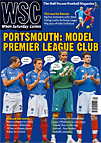 Mark Segal looks at how Europe's media-savvy clubs are competing to reach new supporters on other continents
Mark Segal looks at how Europe's media-savvy clubs are competing to reach new supporters on other continents
Manchester City’s ambitions to break into the Premier League’s top four may still be in the balance this season, but their determination to mix it with the elite in the online world continues apace. Since their takeover by the Abu Dhabi Group, City have relaunched their website to critical acclaim and become the kings of social media with popular feeds on Twitter, Facebook and Flickr. Soon after the takeover, City also launched an Arabic version of their website and now they’ve enhanced this offering by adding an Arabic Twitter feed (@CityArabia).
While it could be argued that this shows an admirable commitment to spreading the City message throughout the Middle East, the fact the feed only has, at the time of writing, 24 followers could also lead to suggestions that there is a little bit of brown-nosing going on in City’s media department. But far from being trendsetters in this area, City are in fact playing catch-up, not least with their neighbours United who launched a Chinese version of their official website as far back as 2002. Since then United have added Japanese, Korean and Arabic versions to their stable as they attempt to grow their overseas fanbase and open up new revenue streams which they hope will help service the huge debt at Old Trafford.
These websites have become key parts of the strategy that a number of clubs are using to break into foreign markets, which also include pre-season tours, link-ups with local clubs and high-profile visits by club legends. But while United have concentrated on the Far East route some of their rivals are looking in a different direction.
Chelsea have both Russian and Italian versions of their websites – another possible case of sucking up to the boss. But, like Arsenal, they also appear to have been directing their attentions to the USA where both clubs have launched American-facing sites. While at the start of the Premier League era clubs believed their growth lay in expanding into Asia, the boom in the American soccer market in recent years has turned the heads of marketing departments west.
At present these sites lean heavily on their English cousins, with just a few added extras to give the pages an American flavour. Although, interestingly, Arsenal’s site also features links to their “official partner club” – Colorado Rapids. The sites clearly have a purpose in making foreign fans feel part of the club but it is questionable whether, at present, they offer value for money. But they could in the future. The one thing all have in common is that they include club-branded video players which offer news, interviews and limited match highlights, and these could be gateways to fortunes.
Despite being in the deepest recession for generations, the sports business pages have recently been sprinkled with stories of Premier League chief executive Richard Scudamore returning home with yet another bumper foreign TV deal in his back pocket. At last count it was claimed that Scudamore had raised over £1 billion for his 20 members with his global sales pitches for the next round of TV rights.
And as the money on offer continues to grow it seems inevitable that some of the top clubs will attempt to claim a bigger share of the pie believing they are the league’s big draws. If the Premier League don’t play ball, they could potentially turn to their foreign language sites to stream their own games live outside the UK.
Sadly for some clubs it seems this potential windfall has come too late, with a number of teams scaling back their foreign operations. Liverpool launched both China and Hong Kong-based sites a number of years ago as they tried to keep pace with Manchester United’s expansion into the Far East. But now if you go to either site they direct you straight back to the club’s English URL. Everton also had a go by launching a Thai-language site when they teamed up with Chang beer but that site also now appears to be down.
However this does not mean the field is clear for England’s top three as many of Europe’s biggest clubs have also invested in websites designed to appeal to the Far Eastern market – AC Milan’s website is translated into seven languages. But without offering exclusive match video it’s debatable whether any of these sites have a real commercial value. But they clearly matter in terms of prestige which is why, you think, that Manchester City have become involved.
From WSC 278 April 2010